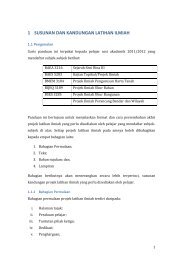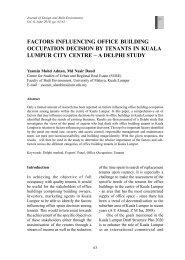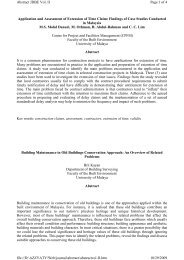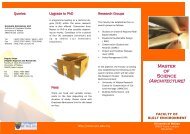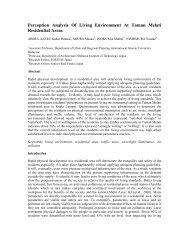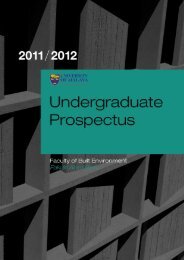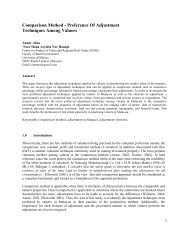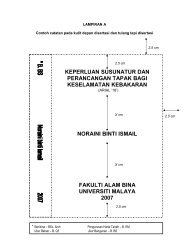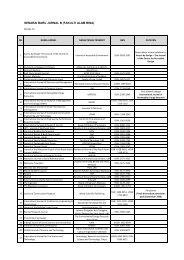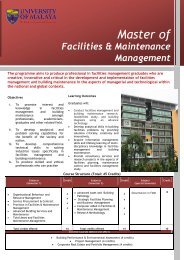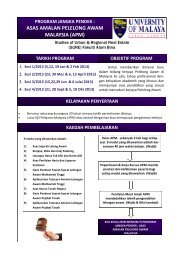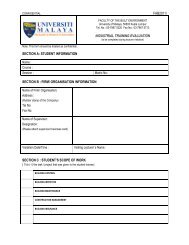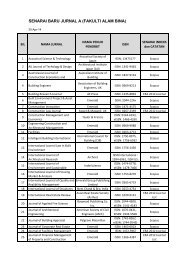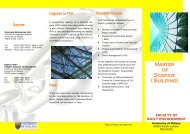Bachelor of Quantity Surveying - Faculty of Built Environment
Bachelor of Quantity Surveying - Faculty of Built Environment
Bachelor of Quantity Surveying - Faculty of Built Environment
Create successful ePaper yourself
Turn your PDF publications into a flip-book with our unique Google optimized e-Paper software.
<strong>Faculty</strong> <strong>of</strong> <strong>Built</strong> <strong>Environment</strong> > Undergraduate Prospectus > 1
<strong>Faculty</strong> <strong>of</strong> <strong>Built</strong> <strong>Environment</strong> > Undergraduate Prospectus > 2
<strong>Faculty</strong> <strong>of</strong> <strong>Built</strong> <strong>Environment</strong> > Undergraduate Prospectus > 3<br />
QUANTITY SURVEYING<br />
Introduction<br />
The course was initiated in 1995. In July 1996, the first batch <strong>of</strong> students enrolled for their studies in <strong>Bachelor</strong> <strong>of</strong><br />
<strong>Quantity</strong> <strong>Surveying</strong> under a new program called <strong>Built</strong> <strong>Environment</strong> Program which was subsequently upgraded<br />
to <strong>Built</strong> <strong>Environment</strong> Division under the umbrella <strong>of</strong> the <strong>Faculty</strong> <strong>of</strong> Engineering. Later, the Division was upgraded<br />
into a full-fledged faculty known as the <strong>Faculty</strong> <strong>of</strong> the <strong>Built</strong> <strong>Environment</strong> in May 2000.<br />
Programme Goal(s)<br />
To produce graduates with a pr<strong>of</strong>essional degree in <strong>Quantity</strong> <strong>Surveying</strong> to practice within but not limited to the<br />
construction industry both local and international who can understand and apply knowledge effectively with<br />
high awareness <strong>of</strong> culture and ethics.<br />
Programme Learning Outcomes<br />
At the end <strong>of</strong> the programme, graduates are able to:<br />
• Define and describe the relevant knowledge in the area <strong>of</strong> quantity surveying.<br />
• Demonstrate the necessary technical and practical skills in the quantity surveying field.<br />
• Carry out pr<strong>of</strong>essional responsibilities towards all relevant stakeholders in the industry.<br />
• Demonstrate the required level <strong>of</strong> pr<strong>of</strong>essionalism and commitment to ethical practice.<br />
• Demonstrate the ability to give views that are pr<strong>of</strong>icient, logical and pr<strong>of</strong>essionally sound in all forms<br />
<strong>of</strong> communication and the ability to work independently and collaboratively as a team leader.<br />
• Identify and analyse problems, evaluate strategic choices, able to arrive at a decision with<br />
supporting evidence and give good judgement.<br />
• Express the ability and interest in accumulating knowledge to enhance self-development.<br />
• Develop effective and efficient managerial and entrepreneurial skills.<br />
Programme Structure<br />
The structure <strong>of</strong> the <strong>Quantity</strong> <strong>Surveying</strong> Program in University <strong>of</strong> Malaya has been formulated with the<br />
assistance from the Institution <strong>of</strong> Surveyors Malaysia (ISM) and designed in accordance with the general<br />
guidelines provided by the Board <strong>of</strong> <strong>Quantity</strong> Surveyors Malaysia (BQSM) and the Royal Institution <strong>of</strong><br />
Chartered Surveyors (RICS), United Kingdom and has received accreditations from BQSM and RICS<br />
respectively.<br />
The course structure consists <strong>of</strong> four (4) years full time studies and divided into two (2) durations <strong>of</strong> studies per<br />
year (Semester I and Semester II). Upon graduation and having worked for two (2) years under the supervision<br />
<strong>of</strong> a Registered <strong>Quantity</strong> Surveyor, students are eligible to sit for the examination <strong>of</strong> the Test <strong>of</strong> Pr<strong>of</strong>essional<br />
Competence in order to obtain the recognition as a Registered <strong>Quantity</strong> Surveyor from the BQSM.<br />
Examination and Assessment<br />
In line with Semester System principles, examinations are conducted twice a year that is at the end <strong>of</strong> each<br />
semester. Generally, the final exam marks is not less than 60% <strong>of</strong> the total marks, while assessment based<br />
on coursework is not more than 40% <strong>of</strong> the overall marks. However, for certain subjects, for example<br />
Integrated Projects 1-3, Practical Training and Final Year Academic Project the assessment are solely based<br />
on the coursework and continuous assessment
<strong>Faculty</strong> <strong>of</strong> <strong>Built</strong> <strong>Environment</strong> > Undergraduate Prospectus > 4<br />
ACADEMIC STAFF<br />
HEAD OF DEPARTMENT<br />
Dr Faizul Azli Mohd Rahim<br />
PhD (Life Cycle Risk) (Liverpool), MSc. IT (Prop & Const) (Salford),<br />
B.Sc (Hons) QS (Salford), MIVMM, MCIOB<br />
Room: C25, Survey Block.<br />
Tel : 03-79675331/5375<br />
email : azli@um.edu.my<br />
PROFESSORS<br />
ASSOCIATE PROFESSOR<br />
Dr. Hamzah Abdul Rahman<br />
PhD Proj Mgmt (UMIST), MSc. Const Mgmt (Florida), B.Sc Const Tech (CMSU), Dip.Building<br />
(UiTM),<br />
FRICS, MCIOB<br />
Room: UC24, Survey Block.<br />
Tel : 03-79675252/3202<br />
email : arhamzah@um.edu.my<br />
Dr. Sr Khairuddin Sulaiman<br />
PhD. Health & Safety (Salford), MSc. Const (Loughborough), B.Sc QS (Glasgow), Dip.QS (UiTM), ,<br />
MISM,<br />
Reg. <strong>Quantity</strong> Surveyor MRICS<br />
Room: UC14, Survey Block.<br />
Tel : 03-79676824<br />
email : khairsulaiman@um.edu.my<br />
SENIOR LECTURERS<br />
Dr. Hafez Salleh<br />
PhD Strategic IT Management (Salford, UK),<br />
MSc.IT Property & Construction (Salford, UK),<br />
Dip.QS (UiTM), B.Sc(Hons) QS (Salford, UK)<br />
Room : UC36 Survey Block<br />
Tel : 03-79675372/6820<br />
email : hafez@um.edu.my<br />
Sr Dr. Zulkiflee Abdul Samad<br />
PHD(Cambridge), MSc. Proj Mgmt (USM), MAppMgt(Arch) (Newcastle),<br />
MBA (Paris), B.(Hons) QS (UiTM),<br />
PMP FRICS FCIOB FAPM FCAM FAAPM MASI MICPMA MMIM MISM ICECA RegQS(M’sia)<br />
Room: C24, <strong>Built</strong> <strong>Environment</strong> Block.<br />
Tel : 03-79674474<br />
email : zulkiflee1969@um.edu.my<br />
Suraya Ismail**<br />
MSc. Const Mgmt & Econs (UCL),<br />
B.Sc(Hons) QS (Reading), MIVMM<br />
Email suraya@um.edu.my<br />
Norhanim Zakaria<br />
MSc. Const Mgmt (UTM),<br />
Dip.QS (UTM), B.(Hons)QS (UTM), MIVMM<br />
Room: UD20, <strong>Built</strong> <strong>Environment</strong> Block.<br />
Tel : 03-79676875<br />
email : norhanimz@um.edu.my
<strong>Faculty</strong> <strong>of</strong> <strong>Built</strong> <strong>Environment</strong> > Undergraduate Prospectus > 5<br />
Mohd Suhaimi Mohd Danuri<br />
MConstrLaw (Melb),<br />
B.(Hons) QS (UTM), Dip.QS (UTM), MIVMM<br />
Room: C27 <strong>Built</strong> <strong>Environment</strong> Block.<br />
Tel : 03-7967 4473<br />
email : suhaimi@um.edu.my<br />
Dr Wang Chen<br />
Ph.D <strong>Built</strong> <strong>Environment</strong> (UM),<br />
M.Sc Civil Engineering (UM),<br />
B.Sc Civil Engineering (Tianjin University),<br />
Room : UD19, Survey Block.<br />
Tel: 03-79676860<br />
email : wcuworkhard@gmail.com<br />
LECTURERS<br />
Imran Ariff Yahya<br />
MSc.(Building) (UM),<br />
B.Sc (Hons) QS (Salford), MIVMM<br />
Room: UD04, Survey Block.<br />
Tel : 03-79676846<br />
email : imranariff@um.edu.my<br />
Mahanim Hanid*<br />
MSc. Bldg Tech (USM),<br />
Dip.QS (UTM), B.(Hons)QS (UM), MIVMM<br />
Room: UD27, Survey Block.<br />
Tel : 03-79676837<br />
email : mahanim@um.edu.my<br />
Maznah Othman<br />
MSc. Proj Mgmt (USM)<br />
B.Sc(Hons)HBP (USM)<br />
Room: UD21, Survey Block.<br />
Tel : 03-79676847<br />
email maznah_o@um.edu.my<br />
Othman Mohamed*<br />
MSc. Bldg Tech (USM), MSc.Info Mgmt (UiTM),<br />
Dip.QS (UiTM), B.(Hons)QS (UTM),<br />
Cert. in Edu (MPKB), Cert. in Value Mgmt (CIDB), MIVMM<br />
email : othmanmohamed@um.edu.my<br />
Muhammad Ehsan Che Munaaim*<br />
MSc Const Mgmt (UTM),<br />
B.(Hons with Distinction) QS (UM), LLM Const Law (Strathclyde),<br />
MCIArb<br />
email : ehsan@um.edu.my<br />
Sr. Umi Kalsum Zolkafli @ Zulkifly<br />
MSc. Contract Management (UTM),<br />
Dip.QS (UTM), B.(Hons)QS (UITM), MISM, Reg. QS<br />
Room: UD29, Survey Block.<br />
Tel : 03-79676872<br />
email : umi@um.edu.my<br />
Note: * On study leave<br />
** secondment to Khazanah Nasional
<strong>Faculty</strong> <strong>of</strong> <strong>Built</strong> <strong>Environment</strong> > Undergraduate Prospectus > 6<br />
EXTERNAL EXAMINERS<br />
Martin Skitmore<br />
MSc. PhD Construction Management FRICS MCIOB<br />
Queensland University <strong>of</strong> Technology<br />
Email : skitmore@qut.edu.au<br />
SLAI/SLAB FELLOWS<br />
Saipol Bari Abd Karim<br />
MSc. Mgmt <strong>of</strong> Proj (Manchester),<br />
B.(Hons) QS (UM), MIVMM<br />
Room: UD03, Survey Block.<br />
Tel : 03-79676834<br />
email : saipolbari@um.edu.my<br />
Kho Mei Yee<br />
BSc <strong>Quantity</strong> <strong>Surveying</strong> (UM), MSc (Construction) (UM)<br />
Room: CPFM<br />
Tel: 03-7967 7600<br />
e-mail: khomeiye@yahoo.com<br />
Nur Mardhiyah Aziz<br />
BSc <strong>of</strong> Housing, Building & Planning (<strong>Quantity</strong> <strong>Surveying</strong>) (Hons), MSc (Facilities Mgt)<br />
Room : Postgraduate<br />
Tel: 03-7967 7603<br />
e-mail: nurmardhiyah@gmail.com<br />
Norshuhada Zainol<br />
BSc (<strong>Quantity</strong> <strong>Surveying</strong>), MSc (Construction Economics & Mgt)<br />
Room : Postgraduate<br />
Tel: 03-7967 7603<br />
e-mail: zshuhada@gmail.com
<strong>Faculty</strong> <strong>of</strong> <strong>Built</strong> <strong>Environment</strong> > Undergraduate Prospectus > 7<br />
Programme Structure : <strong>Bachelor</strong> <strong>of</strong> <strong>Quantity</strong> <strong>Surveying</strong> (Session 2011/2012)<br />
CATEGORY NO CODE SUBJECT<br />
FACULTY<br />
COURSES<br />
Measurement<br />
20 Credits<br />
16%<br />
<strong>Quantity</strong><br />
<strong>Surveying</strong><br />
Pr<strong>of</strong>essional<br />
Practice<br />
6 Credits<br />
5%<br />
Technology<br />
in Construction<br />
20 Credits<br />
16%<br />
Management in<br />
Construction<br />
12 Credits<br />
10%<br />
Economics<br />
12 Credits<br />
10%<br />
Law<br />
9 Credits<br />
7%<br />
<strong>Quantity</strong><br />
<strong>Surveying</strong><br />
Integrated<br />
Project<br />
9 Credits<br />
8%<br />
Research and<br />
Training<br />
16 Credits<br />
13%<br />
UNIVERSITY<br />
COURSES<br />
18 Credits<br />
15%<br />
LEVEL I LEVEL II LEVEL III LEVEL IV TOTAL<br />
S1 S2 S3 S4 S5 S6 S7 S8 CREDIT<br />
%<br />
PRE-<br />
REQUISITE<br />
1 BQES1101 Measurement <strong>of</strong> Construction Works I 4 4<br />
2 BQES1201 Measurement <strong>of</strong> Construction Works II 4 4 20 BQES 1101<br />
3 BQES2201 Measurement <strong>of</strong> Construction Works III 4 4 BQES 1201<br />
4 BQES2202 Measurement <strong>of</strong> Construction Works IV 4 4 16% BQES 2201<br />
5 BQES3101 Measurement <strong>of</strong> Construction Works V 4 4<br />
6 BQES 2101 Pr<strong>of</strong>essional Practice I 3 3<br />
7 BQES 3201 Pr<strong>of</strong>essional Practice II 3 3 6 BQES 2101<br />
8 BQES 1102 Construction Technology I 3 3<br />
9 BQES 1202 Construction Technology II 3 3 BQES 1102<br />
10 BQES 2203 Construction Technology III 3 3 BQES 1202<br />
11 BQES 3102 Construction Technology IV 3 3<br />
20<br />
12 BQES 1103 Building Services I 2 2<br />
13 BQES 2204 Building Services II 2 2<br />
16%<br />
BQES 1103<br />
14 BQES 2102 Site Survey 2 2<br />
15 BQES 2103 Building Structure 2 2<br />
16 BQES 2104 Principles <strong>of</strong> Management 2 2<br />
17 BQES 3103 Project Management I 3 3 12<br />
18 BQES 4201 Project Management II 3 3 BQES 3103<br />
19 BQES 3104 Quality and Value Management 2 2 10%<br />
21 BQES 4101 IT Management in Construction 2 2<br />
22 BQES 1104 Construction Economics I 3 3<br />
23 BQES 3202 Construction Economics II 3 3 12 BQES 1104<br />
24 BQES 3105 Financial Management and Accounting 2 2<br />
25 BQES 1105 Data Analysis 2 2 10%<br />
26 BQES 3106 Property Development 2 2<br />
27 BQES 1106 Legal Studies 3 3<br />
28 BQES 2105 Construction Law I 3 3<br />
9<br />
29 BQES 3203 Construction Law II 3 3 BQES 2105<br />
7%<br />
30 BQES 2106 Integrated Project I 3 3<br />
31 BQES 2107 Integrated Project II 3 3<br />
32 BQES 3107 Integrated Project III 3 3<br />
33 BQES 3108 Academic Project 3 3 6<br />
progressive<br />
34 BQES 4102 Industrial Training 10 10<br />
16<br />
progressive<br />
35 GXEX 1401 Information Skill 1 1<br />
36 GXEX Islamic and Asian Civilisation/<br />
2 2<br />
1414/1413 Introduction to Malaysia*<br />
37 GXEX 1411 Ethnic Relationship 2 2<br />
38 GXEX 1412 Fundamentals for Entrepreneurship<br />
2 2<br />
Culture<br />
39 Co-Curriculum 2 2<br />
40 English 1 3 3<br />
41 English 2 3 3<br />
42 Elective Course 3 3<br />
TOTAL CREDITS 17 16 16 17 17 18 11 10 122<br />
TOTAL SUBJECTS 6 6 6 6 7 6 4 1 42<br />
TOTAL UNIVERSITY COURSES 2 2 0 1 2 0 1 0 8 42<br />
TOTAL FACULTY COURSES 4 4 6 5 5 6 3 1 34<br />
Note : * Course <strong>of</strong>fered to non-Malaysian students in lieu <strong>of</strong> Islamic and Asian Civilisation<br />
TOTAL SUBJECT<br />
BREAKDOWN<br />
5%<br />
9<br />
8%<br />
13%<br />
18<br />
15%
<strong>Faculty</strong> <strong>of</strong> <strong>Built</strong> <strong>Environment</strong> > Undergraduate Prospectus > 8<br />
PROGRAMME STRUCTURE : BACHELOR OF QUANTITY SURVEYING (SESSION 2011/2012)<br />
YEAR 1 (<strong>Bachelor</strong> <strong>of</strong> <strong>Quantity</strong> <strong>Surveying</strong>)<br />
COMPONENTS<br />
COURSE<br />
CODE<br />
SEMESTER 1 SEMESTER 2<br />
COURSE TITLE<br />
CREDIT<br />
COURSE<br />
CODE<br />
COURSE TITLE<br />
CREDIT<br />
TOTAL<br />
CREDIT<br />
Compulsory<br />
University<br />
Courses<br />
GXEX1414/<br />
1413<br />
Islamic and Asian<br />
Civilisation / Introduction<br />
to Malaysia<br />
2 English 2 3<br />
English 1 3 GXEX1401 Information Skills 1<br />
9<br />
BQES1101<br />
Measurement <strong>of</strong><br />
Construction Works I<br />
4 BQES1201<br />
Measurement <strong>of</strong><br />
Construction Works<br />
4<br />
Programme<br />
Core Courses<br />
BQES1102 Construction Technology I 3 BQES1104 Construction Economics I 3<br />
BQES1105 Data Analysis 2 BQES1103 Building Services I 2<br />
24<br />
BQES1106 Legal Studies 3 BQES1202 Construction Technology II 3<br />
TOTAL CREDIT 17 TOTAL CREDIT 16 33<br />
YEAR 2 (<strong>Bachelor</strong> <strong>of</strong> <strong>Quantity</strong> <strong>Surveying</strong>)<br />
COMPONENTS<br />
Compulsory<br />
University<br />
Courses<br />
Programme<br />
Core Courses<br />
COURSE<br />
CODE<br />
BQES2201<br />
BQES2203<br />
SEMESTER 3 SEMESTER 4<br />
COURSE TITLE<br />
CREDIT<br />
COURSE<br />
CODE<br />
COURSE TITLE<br />
-Not <strong>of</strong>fered- - GXEX 1411 Ethnic Relationship<br />
Measurement <strong>of</strong><br />
Construction Works III<br />
Construction Technology<br />
III<br />
4 BQES2202<br />
Measurement <strong>of</strong><br />
Construction Works IV<br />
3 BQES2101 Pr<strong>of</strong>essional Practice I<br />
BQES2204 Building Services II 2 BQES2107 Integrated Project II<br />
BQES2102 Site Survey 2 BQES2105 Construction Law I<br />
CREDIT<br />
2<br />
4<br />
3<br />
3<br />
3<br />
TOTAL<br />
CREDIT<br />
2<br />
31<br />
BQES2106 Integrated Project I 3 BQES2103 Building Structure<br />
2<br />
BQES2104 Principles Management 2<br />
TOTAL CREDIT 16 TOTAL CREDIT 17 33
<strong>Faculty</strong> <strong>of</strong> <strong>Built</strong> <strong>Environment</strong> > Undergraduate Prospectus > 9<br />
COMPONENTS<br />
Compulsory<br />
University<br />
Courses<br />
Programme<br />
Core Courses<br />
COURSE<br />
CODE<br />
GXEX 1412<br />
BQES3101<br />
BQES3105<br />
YEAR 3 (<strong>Bachelor</strong> <strong>of</strong> <strong>Quantity</strong> <strong>Surveying</strong>)<br />
SEMESTER 5 SEMESTER 6<br />
COURSE TITLE<br />
Fundamentals for<br />
Entrepreneurship Culture<br />
CREDIT<br />
Co-Curriculum 2<br />
Measurement <strong>of</strong><br />
Construction Works V<br />
Financial Management and<br />
Accounting<br />
COURSE<br />
CODE<br />
COURSE TITLE<br />
2 -Not <strong>of</strong>fered- -<br />
4 BQES3201 Pr<strong>of</strong>essional Practice II<br />
2 BQES3102<br />
Construction<br />
Technology IV<br />
BQES3106 Property Development 2 BQES3103 Project Management 1<br />
BQES3108 Academic Project 3 BQES3202 Construction Economics II<br />
CREDIT<br />
3<br />
3<br />
3<br />
3<br />
TOTAL<br />
CREDIT<br />
4<br />
31<br />
BQES3104<br />
Quality and Value<br />
Management<br />
2 BQES3107 Integrated Project III<br />
BQES3108<br />
Academic Project<br />
3<br />
3<br />
TOTAL CREDIT 17 TOTAL CREDIT 18 35<br />
YEAR 4 (<strong>Bachelor</strong> <strong>of</strong> <strong>Quantity</strong> <strong>Surveying</strong>)<br />
COMPONENTS<br />
Compulsory<br />
University<br />
Courses<br />
COURSE<br />
CODE<br />
SEMESTER 7 SEMESTER 8<br />
COURSE TITLE<br />
-Not <strong>of</strong>fered-<br />
CREDIT<br />
-<br />
COURSE<br />
CODE<br />
COURSE TITLE<br />
-Not <strong>of</strong>fered-<br />
CREDIT<br />
TOTAL<br />
CREDIT<br />
BQES4201 Project Management II 3<br />
Programme<br />
Core Courses<br />
BQES3203 Construction Law II 3<br />
BQES4101<br />
IT Management<br />
Construction<br />
Kursus Elektif Luar Fakulti 3<br />
2<br />
Industrial Training 10 21<br />
TOTAL CREDIT 11 TOTAL CREDIT 10 21<br />
OVERALL TOTAL CREDIT : 122
<strong>Faculty</strong> <strong>of</strong> <strong>Built</strong> <strong>Environment</strong> > Undergraduate Prospectus > 10<br />
PROGRAMME CORE COURSES<br />
BQES 1101<br />
4 credits<br />
MEASUREMENT OF CONSTRUCTION WORKS I<br />
Synopsis <strong>of</strong> Course Contents<br />
This course includes the principles and function <strong>of</strong> Standard Method <strong>of</strong> Measurement (SMM), the use <strong>of</strong><br />
specification and development <strong>of</strong> the quantity surveying pr<strong>of</strong>ession in construction industry. The course<br />
also covers the principles <strong>of</strong> estimating, component <strong>of</strong> prices and built-up rate for various trades.<br />
Learning Outcomes<br />
At the end <strong>of</strong> the course, students are able to:<br />
1. define the purpose, principles and functions <strong>of</strong> standard method <strong>of</strong> measurement (smm);<br />
2. describe the principle <strong>of</strong> specification writing and estimating;<br />
3. use drawing specification and estimating; and<br />
4. apply taking <strong>of</strong>f quantities for construction works and estimating.<br />
Assessment:<br />
Continuous Assessment 40%<br />
Final Examination 60%<br />
S<strong>of</strong>t Skills:<br />
CS1, CT1, CT2, CT3, TS1, LL1<br />
BQES 1102<br />
3 credits<br />
CONSTRUCTION TECHNOLOGY I<br />
Synopsis <strong>of</strong> Course Contents<br />
This course provides knowledge on current application <strong>of</strong> construction technology. It includes<br />
construction system and foundation, floor, stairs, walls, ro<strong>of</strong> and ceiling, doors and windows, finishing and<br />
construction materials.<br />
Learning Outcomes<br />
At the end <strong>of</strong> the course, students are able to:<br />
1. define and describe the processes and stages <strong>of</strong> simple building construction;<br />
2. explain the various types <strong>of</strong> construction methods and their application in accordance to each projects<br />
specific need; and<br />
3. apply the knowledge <strong>of</strong> building technology in preparing take <strong>of</strong>f quantities according to the standard<br />
method <strong>of</strong> measurement 2 (smm2).<br />
Assessment:<br />
Continuous Assessment 40%<br />
Final Examination 60%<br />
S<strong>of</strong>t Skills:<br />
CS1, CS2, CS3, CT1, CT2, CT3, CT4, TS1, TS2, LL1, LL2<br />
BQES 1103<br />
2 credits<br />
BUILDING SERVICES I<br />
Synopsis <strong>of</strong> Course Contents<br />
Introduction to various type <strong>of</strong> building services system on low rise and high rise buildings; water supply<br />
and sanitation system, drainage and waste water system, reservoir system, plumbing<br />
Learning Outcomes<br />
At the end <strong>of</strong> the course, students are able to:<br />
1. explain various type <strong>of</strong> services in buildings;<br />
2. discuss the design, installation and location <strong>of</strong> equipment in services system; and<br />
3. describe the needs and limitations <strong>of</strong> building services system.<br />
Assessment:<br />
Continuous Assessment 40%<br />
Final Examination 60%<br />
S<strong>of</strong>t Skills:<br />
CS1, CS2, CS3, CS4, CT1, CT2, CT3, CT4, CT5, TS1, TS2, LL1, LL2, LL3, KK1,<br />
KK2, EM1, EM2, EM3
<strong>Faculty</strong> <strong>of</strong> <strong>Built</strong> <strong>Environment</strong> > Undergraduate Prospectus > 11<br />
BQES 1104<br />
3 credits<br />
CONSTRUCTION ECONOMICS I<br />
Synopsis <strong>of</strong> Course Contents<br />
This course covers the introduction <strong>of</strong> micro and macroeconomics. The introduction to the nature <strong>of</strong> the<br />
construction economics discuss some basic concepts in economics that explained the nature <strong>of</strong><br />
construction industry and <strong>of</strong> construction markets, types <strong>of</strong> cost, price, pr<strong>of</strong>it, marginal analysis and,<br />
demand and supply. The relationships <strong>of</strong> the construction industry to the economy discuss the<br />
interaction with the economy and construction industry as a regulator <strong>of</strong> the economy. This course<br />
also includes a broad understanding <strong>of</strong> the development process and parties involved in construction<br />
industry, cost <strong>of</strong> building, value for money, design evaluation and buildability. It also covers the theory <strong>of</strong><br />
construction firm, procurement and tendering for construction project, its contractual liabilities and<br />
financial implication on client’s firm.<br />
Learning Outcomes<br />
At the end <strong>of</strong> the course, students are able to:<br />
1. identify the basic knowledge <strong>of</strong> micro and macroeconomics;<br />
2. explain the relationship between construction industry and the economy;<br />
3. describe the basic principles <strong>of</strong> construction economics; and<br />
4. apply knowledge <strong>of</strong> economic theory to the construction industry.<br />
Assessment:<br />
Continuous Assessment 30%<br />
Final Examination 70%<br />
S<strong>of</strong>t Skills:<br />
CS1, CT1, CT2, CT3, CT4, TS1, LL1, LL2, KK1, EM1, EM2<br />
BQES 1105<br />
2 credits<br />
DATA ANALYSIS<br />
Synopsis <strong>of</strong> Course Contents<br />
This course delivers the methodological and technical knowledge <strong>of</strong> a wide range <strong>of</strong> analytical<br />
methods used in data analysis. It provides the logical thinking and analysis <strong>of</strong> data in various forms and<br />
using a variety <strong>of</strong> qualitative and quantitative tools and techniques. The tools and techniques in this<br />
course includes methods <strong>of</strong> grouping, structuring, sampling and presentation <strong>of</strong> data, tabling, frequency<br />
distribution, graphical representation, measures <strong>of</strong> location and deviation, ratio, percentage analysis and<br />
probability theories.<br />
Learning Outcomes<br />
At the end <strong>of</strong> the course, students are able to:<br />
1. identify and describe the knowledge on theories, principles and concepts <strong>of</strong> the statistical methods,<br />
covering the use <strong>of</strong> quantitative and qualitative data analysis;<br />
2. analyse and evaluate problems related to the use <strong>of</strong> data analysis in the context <strong>of</strong> construction<br />
industry; and<br />
3. evaluate strategic choices in arriving a decision that are logical and pr<strong>of</strong>essionally.<br />
Assessment:<br />
Continuous Assessment 30%<br />
Final Examination 70%<br />
S<strong>of</strong>t Skills:<br />
CS1, CS2, CT1, CT2, CT3, CT4, CT5, CT6, TS1, TS2, LL1
<strong>Faculty</strong> <strong>of</strong> <strong>Built</strong> <strong>Environment</strong> > Undergraduate Prospectus > 12<br />
BQES 1106<br />
3 credits<br />
LEGAL STUDIES<br />
Synopsis <strong>of</strong> Course Contents<br />
This course focuses on Malaysian Legal System, tort and contract. It includes the principles and sources<br />
<strong>of</strong> Malaysian law, processes, systems and procedures, common law, statute and equity. This course<br />
covers the law <strong>of</strong> contract (Contracts Act 1950) emphasizing on capacity, consideration, intention to<br />
create legal relation and methods <strong>of</strong> discharging <strong>of</strong> contracts. It will also include the types <strong>of</strong> remedies<br />
covering damages, specific performance and injunction by making a specific reference to the Specific<br />
Relief Act 1950. The law <strong>of</strong> torts includes negligence, duty <strong>of</strong> care, breach <strong>of</strong> duty, causation,<br />
remoteness, pr<strong>of</strong>essional negligence, nuisance and trespass to land.<br />
Learning Outcomes<br />
At the end <strong>of</strong> the course, students are able to:<br />
1. Explain the Malaysian Legal System;<br />
2. Identify the principles, sources, processes and procedures <strong>of</strong> the Malaysian legal system, tort and<br />
contract;<br />
3. Apply the principle <strong>of</strong> the Malaysian Legal System; and<br />
4. Apply the principle and procedure <strong>of</strong> law <strong>of</strong> tort and contract.<br />
Assessment:<br />
Continuous Assessment 40%<br />
Final Examination 60%<br />
S<strong>of</strong>t Skills:<br />
CS1, CS2, CS3, CT1, CT2, CT3, CT4,TS1, TS2, TS3, LL1, LL2, KK1, EM1, EM2,<br />
EM3, LS1, LS2<br />
BQES 1201<br />
4 credits<br />
MEASUREMENT OF CONSTRUCTION WORKS II<br />
Synopsis <strong>of</strong> Course Contents<br />
This course includes the principles and function <strong>of</strong> Standard Method <strong>of</strong> Measurement (SMM), the use <strong>of</strong><br />
specification and development <strong>of</strong> the quantity surveying pr<strong>of</strong>ession in construction industry. The course<br />
also covers the principles <strong>of</strong> estimating, component <strong>of</strong> prices and built-up rate for various trades.<br />
Learning Outcomes<br />
At the end <strong>of</strong> the course, students are able to:<br />
1. define the purpose, principles and functions <strong>of</strong> standard method <strong>of</strong> measurement (smm);<br />
2. describe the principle <strong>of</strong> specification writing and estimating;<br />
3. use drawing specification and estimating; and<br />
4. apply taking <strong>of</strong>f quantities for construction works and estimating.<br />
Assessment:<br />
Continuous Assessment 40%<br />
Final Examination 60%<br />
S<strong>of</strong>t Skills:<br />
CS1, CS2, CS3, CS4, CT1, CT2, CT3, CT4, TS1, TS2, LL1, LL2, KK1, EM1<br />
BQES 1202<br />
3 credits<br />
CONSTRUCTION TECHNOLOGY II<br />
Synopsis <strong>of</strong> Course Contents<br />
This course extends the students’ knowledge on current application <strong>of</strong> construction technology. It<br />
includes site works and deep foundation, frame, built-in furniture and interior decoration, alteration and<br />
demolition works and construction materials.<br />
Learning Outcomes<br />
At the end <strong>of</strong> the course, students are able to:<br />
1. define and describe the processes and stages <strong>of</strong> small and medium size building construction<br />
project;<br />
2. explain the various types <strong>of</strong> construction methods and their application in accordance to each<br />
projects specific need; and<br />
3. apply the knowledge <strong>of</strong> building technology in preparing take <strong>of</strong>f quantities according to the<br />
standard method <strong>of</strong> measurement 2 (smm2).
<strong>Faculty</strong> <strong>of</strong> <strong>Built</strong> <strong>Environment</strong> > Undergraduate Prospectus > 13<br />
Assessment:<br />
Continuous Assessment 40%<br />
Final Examination 60%<br />
S<strong>of</strong>t Skills:<br />
CS1, CS2, CS3, CS4, CT1, CT2, CT3, CT4, TS1, TS2, LL1, LL2<br />
BQES 2101<br />
3 credits<br />
PROFESSIONAL PRACTICE I<br />
Synopsis <strong>of</strong> Course Contents<br />
This course delivers an overview <strong>of</strong> quantity surveying pr<strong>of</strong>ession in respect <strong>of</strong> its responsibilities and<br />
roles in the public and private sectors. It covers various aspects <strong>of</strong> pr<strong>of</strong>essional practice during the precontract<br />
stage from the inception till the preparation <strong>of</strong> contract document. The course will also cover<br />
the appointment, fees and pr<strong>of</strong>essional ethics, administration <strong>of</strong> quantity surveying firms and<br />
procurement <strong>of</strong> contract. Reference will be made to the relevant provisions in the standard forms <strong>of</strong><br />
building contract and related government circulars. Potential roles <strong>of</strong> quantity surveyors in any other<br />
industries will be explored.<br />
Learning Outcomes<br />
At the end <strong>of</strong> the course, students are able to:<br />
1. define the responsibilities and roles <strong>of</strong> quantity surveyors in construction and other relevant industries;<br />
2. explain the pr<strong>of</strong>essional practice and procedures at pre-contract stage;<br />
3. assess pr<strong>of</strong>icient, logical, sound and pr<strong>of</strong>essional views with regard to the principles and procedures<br />
in the administration <strong>of</strong> construction contract in all forms <strong>of</strong> communication; and<br />
4. solve problems related to the principles and procedures in the administration <strong>of</strong> construction contract.<br />
Assessment:<br />
Continuous Assessment 30%<br />
Final Examination 70%<br />
S<strong>of</strong>t Skills:<br />
CS1, CS2, CT1, CT2, CT3, TS1, LL1, LL2, LL3, EM1<br />
BQES 2102<br />
2 credits<br />
SITE SURVEY<br />
Synopsis <strong>of</strong> Course Contents<br />
The usage <strong>of</strong> lecture mode and hands-on technique are used in this course. It includes the learning<br />
<strong>of</strong> definition and principle <strong>of</strong> survey. The concept and procedure <strong>of</strong> survey. Survey equipment.<br />
Survey levelling. Procedure to ascertain parameter observation, bearing, distance and recording<br />
technique. Measurement <strong>of</strong> area, topography, cutting and filling. Confirmation <strong>of</strong> location for a proposed<br />
building and existing building.<br />
Learning Outcomes<br />
At the end <strong>of</strong> the course, students are able to:<br />
1. explain the principle and method <strong>of</strong> land survey;<br />
2. identify the types and the usage <strong>of</strong> survey equipment; and<br />
3. apply the suitable technique for site survey.<br />
Assessment:<br />
Continuous Assessment 100%<br />
S<strong>of</strong>t Skills:<br />
CS1, CS2, CS3, CS4, CS8, CT1, CT2, CT3, CT4, TS1, TS2, LL1, KK1, KK2, EM1,<br />
EM2, EM3, LS2
<strong>Faculty</strong> <strong>of</strong> <strong>Built</strong> <strong>Environment</strong> > Undergraduate Prospectus > 14<br />
BQES 2103<br />
4 credits<br />
BUILDING STRUCTURE<br />
Synopsis <strong>of</strong> Course Contents<br />
Introduction to building structures and design. Building loading, forces and reaction in structures.<br />
Concurrent coplanar forces, non-current coplanar forces and moment <strong>of</strong> forces. Framed structures.<br />
Material strength and safety factors. Axial forces, shear force and bending moment.<br />
Learning Outcomes<br />
At the end <strong>of</strong> the course, students are able to:<br />
1. identify the type <strong>of</strong> building structures and loading;<br />
2. calculate the loads react on the building members; and<br />
3. analyse the forces react on the building structures.<br />
Assessment:<br />
Continuous Assessment 40%<br />
Final Examination 60%<br />
S<strong>of</strong>t Skills:<br />
CS1, CS2, CS3, CT1, CT2, TS1, TS2, LL1, EM1<br />
BQES2104<br />
2 credits<br />
PRINCIPLES MANAGEMENT<br />
Synopsis <strong>of</strong> Course Contents<br />
This course examines the history <strong>of</strong>, principles and current issues in management and organization<br />
studies. It covers the principles and practices <strong>of</strong> modern organisation management include<br />
characteristics, structure, behaviour and effectiveness <strong>of</strong> organization, teamwork and leadership, values<br />
and culture <strong>of</strong> organization. The course will include the changing role <strong>of</strong> management, managerial skills<br />
and competencies, and strategic corporate management and framework for understanding the<br />
processes <strong>of</strong> management (e.g. planning, strategic decision making, SWOT analysis, corporate<br />
objectives, strategies and policies). This course will also cover the managerial identity and how it is<br />
constructed and consideration is given to what it means to be an effective human resources<br />
management system (e.g. staffing, organizing, coordinating, communication, and control).<br />
Learning Outcomes<br />
At the end <strong>of</strong> the course, students are able to:<br />
1. identify the basic knowledge <strong>of</strong> management required for the construction industry.<br />
2. explain the concept and principle <strong>of</strong> management, organizational characteristics, human resource<br />
management and decision making.<br />
3. develop managerial, teamwork and entrepreneurial skills.<br />
Assessment:<br />
Continuous Assessment 30%<br />
Final Examination 70%<br />
S<strong>of</strong>t Skills:<br />
CS1, CS2, CS3, CS4, CT1, CT2, CT3, CT4, TS1, TS2, LL1, LL2, KK1, KK2, EM1,<br />
LS1, LS2
<strong>Faculty</strong> <strong>of</strong> <strong>Built</strong> <strong>Environment</strong> > Undergraduate Prospectus > 15<br />
BQES 2105<br />
3 credits<br />
CONSTRUCTION LAW I<br />
Synopsis <strong>of</strong> Course Contents<br />
This course covers the principles <strong>of</strong> construction law, roles and objectives <strong>of</strong> construction law,<br />
construction contracts and related problems. It includes the Arbitration procedures that are governed by<br />
the standard forms <strong>of</strong> contract and the Arbitration Act 2005. It will also cover the types <strong>of</strong> claims and<br />
legal aspect <strong>of</strong> claims, types <strong>of</strong> repudiation and the law <strong>of</strong> limitation.<br />
Learning Outcomes<br />
At the end <strong>of</strong> the course, students are able to:<br />
1. describe the principles, roles and objectives <strong>of</strong> construction law in construction contracts;<br />
2. demonstrate the ability to give views that are pr<strong>of</strong>icient, logical and pr<strong>of</strong>essionally sound with regard to<br />
the aspects <strong>of</strong> construction law in all forms <strong>of</strong> communication; and<br />
3. identify problems related to construction law and to evaluate strategic choices in arriving a decision<br />
with supporting evidence and judgment.<br />
Assessment:<br />
Continuous Assessment 30%<br />
Final Examination 70%<br />
S<strong>of</strong>t Skills:<br />
CS1, CS2, CS3, CT1, CT2, CT3, CT4, TS1, TS2, LL1, EM1, EM2<br />
BQES 2106<br />
3 credits<br />
INTEGRATED PROJECT I<br />
Synopsis <strong>of</strong> Course Contents<br />
The standard <strong>of</strong> coursework given is fit and suitable with the student’s academic ability at second year<br />
level. Each group <strong>of</strong> students is guided and supervised by a panel <strong>of</strong> project supervisors which<br />
comprises <strong>of</strong> the quantity surveying lecturers. The theme <strong>of</strong> issues and problems posed in project<br />
coursework are based on the elements <strong>of</strong> one or a combination <strong>of</strong> the fields <strong>of</strong> knowledge related with<br />
pr<strong>of</strong>essional practice and quantity surveying career namely building and construction technology, building<br />
and construction economics, construction project management, facilities management, real estate and<br />
property management, construction law and building contracts and, information technology for the<br />
construction industry and property. Each group is required to present and defend their final output in a<br />
seminar set up solely for the given project coursework<br />
Learning Outcomes<br />
At the end <strong>of</strong> the course, students are able to:<br />
1. identify the basic knowledge <strong>of</strong> quantity surveying and construction industry;<br />
2. recognise the importance <strong>of</strong> knowledge incorporation and integration; and<br />
3. apply the concepts, principles, techniques and academic knowledge gained to re solve given problems.<br />
Assessment:<br />
Continuous Assessment 100%<br />
S<strong>of</strong>t Skills:<br />
CS1, CS2, CT1, CT2, TS1, LL1, EM1<br />
BQES 2107<br />
3 credits<br />
INTEGRATED PROJECT II<br />
Synopsis <strong>of</strong> Course Contents<br />
The standard <strong>of</strong> coursework given is fit and suitable with the student’s academic ability at second year<br />
level. Each group <strong>of</strong> students is guided and supervised by a panel <strong>of</strong> project supervisors which<br />
comprises <strong>of</strong> the quantity surveying lecturers. The theme <strong>of</strong> issues and problems posed in project<br />
coursework are based on the elements <strong>of</strong> one or a combination <strong>of</strong> the fields <strong>of</strong> knowledge related with<br />
pr<strong>of</strong>essional practice and quantity surveying career namely building and construction technology, building<br />
and construction economics, construction project management, facilities management, real estate and<br />
property management, construction law and building contracts and, information technology for the<br />
construction industry and property. Each group is required to present and defend their final output in a<br />
seminar set up solely for the given project coursework<br />
Learning Outcomes<br />
At the end <strong>of</strong> the course, students are able to:<br />
1. identify the basic knowledge <strong>of</strong> quantity surveying and construction industry;<br />
2. recognise the importance <strong>of</strong> knowledge incorporation and integration; and<br />
3. apply the concepts, principles, techniques and academic knowledge gained to re solve given problems.
<strong>Faculty</strong> <strong>of</strong> <strong>Built</strong> <strong>Environment</strong> > Undergraduate Prospectus > 16<br />
Assessment:<br />
Continuous Assessment 100%<br />
S<strong>of</strong>t Skills:<br />
CS1, CS2, CS3, CS4, CT1, CT2, TS1, TS2, TS3, LL1, LL2, EM1, EM2, LS1, LS2<br />
BQES 2201<br />
4 credits<br />
MEASUREMENT OF CONSTRUCTION WORKS III<br />
Synopsis <strong>of</strong> Course Contents<br />
This course includes the principles and function <strong>of</strong> Standard Method <strong>of</strong> Measurement (SMM), the use <strong>of</strong><br />
specification and development <strong>of</strong> the quantity surveying pr<strong>of</strong>ession in construction industry. The course<br />
also covers the principles <strong>of</strong> estimating, component <strong>of</strong> prices and built-up rate for various trades.<br />
Learning Outcomes<br />
At the end <strong>of</strong> the course, students are able to:<br />
1. define the purpose, principles and functions <strong>of</strong> standard method <strong>of</strong> measurement (smm);<br />
2. describe the principle <strong>of</strong> specification writing and estimating;<br />
3. use drawing specification and estimating; and<br />
4. upgrade skills <strong>of</strong> taking <strong>of</strong>f quantities for construction works and estimating.<br />
Assessment:<br />
Continuous Assessment 40%<br />
Final Examination 60%<br />
S<strong>of</strong>t Skills:<br />
CS1, CS2, CS3, CS4, CT1, CT2, CT3, CT4, TS1, TS2, LL1, LL2<br />
BQES 2202<br />
4 credits<br />
MEASUREMENT OF CONSTRUCTION WORKS IV<br />
Synopsis <strong>of</strong> Course Contents<br />
This course includes the principles and function <strong>of</strong> Standard Method <strong>of</strong> Measurement (SMM), the use <strong>of</strong><br />
specification and development <strong>of</strong> the quantity surveying pr<strong>of</strong>ession in construction industry. The course<br />
also covers the principles <strong>of</strong> estimating, component <strong>of</strong> prices and built-up rate for various trades.<br />
Learning Outcomes<br />
At the end <strong>of</strong> the course, students are able to:<br />
1. define the purpose, principles and functions <strong>of</strong> standard method <strong>of</strong> measurement(smm);<br />
2. describe the principle <strong>of</strong> specification writing and estimating;<br />
3. use drawing specification and estimating; and<br />
4. upgrade skills <strong>of</strong> taking <strong>of</strong>f quantities for construction works and estimating.<br />
Assessment:<br />
Continuous Assessment 40%<br />
Final Examination 60%<br />
S<strong>of</strong>t Skills:<br />
CS1, CS2, CS3, CS4, CS5, CT1, CT2, CT3, CT4, CT5, TS1, TS2, TS3, LL1, LL2,<br />
LL3<br />
BQES 2203<br />
3 credits<br />
CONSTRUCTION TECHNOLOGY III<br />
Synopsis <strong>of</strong> Course Contents<br />
This course extends the students’ knowledge on current application <strong>of</strong> construction technology. It<br />
includes heavy substructure, prefabrication, pre and post tension concrete, formwork, external works,<br />
building maintenance and building materials.<br />
Learning Outcomes<br />
At the end <strong>of</strong> the course, students are able to:<br />
1. define and describe the principles, design, methods <strong>of</strong> construction;<br />
2. apply the knowledge in identifying problems in specific building construction and civil works;<br />
3. demonstrate the ability to produce the alternative solutions for building construction to un<br />
compromising factors <strong>of</strong> cost, time and quality; and<br />
4. apply the knowledge <strong>of</strong> building technology in preparing take <strong>of</strong>f quantities according to the standard<br />
method <strong>of</strong> measurement 2 (smm2).
<strong>Faculty</strong> <strong>of</strong> <strong>Built</strong> <strong>Environment</strong> > Undergraduate Prospectus > 17<br />
Assessment:<br />
Continuous Assessment 40%<br />
Final Examination 60%<br />
S<strong>of</strong>t Skills:<br />
CS1, CS2, CS3, CS4, CS5, CT1, CT2, CT3, CT4, CT5, TS1, TS2, TS3, LL1, LL2,<br />
LL3<br />
BQES 2204<br />
2 credits<br />
BUILDING SERVICES II<br />
Synopsis <strong>of</strong> Course Contents<br />
Introduction to the various type <strong>of</strong> M&E systems within a building such as type <strong>of</strong> cable, telephone and<br />
communication system, safety and security system, mechanical transportation system, air-conditioning<br />
and mechanical ventilation system, lighting and electrical system, and Building Automation System<br />
(BAS).<br />
Learning Outcomes<br />
At the end <strong>of</strong> the course, students are able to:<br />
1. Explain the various type <strong>of</strong> mechanical and electrical (M&E), plus other systems that are related to a<br />
building;<br />
2. Identify the needs <strong>of</strong> mechanical and electrical system within a building; and<br />
3. Determine simple mechanical and electrical systems installed within a building.<br />
Assessment:<br />
Continuous Assessment 40%<br />
Final Examination 60%<br />
S<strong>of</strong>t Skills:<br />
CS1, CS2, CS3, CT1, CT2, CT3, CT4, TS1, TS2, LL1, LL2<br />
BQES 3101<br />
4 credits<br />
MEASUREMENT OF CONSTRUCTION WORKS V<br />
Synopsis <strong>of</strong> Course Contents<br />
This course includes the principles and function <strong>of</strong> Civil Engineering Standard Method <strong>of</strong> Measurement<br />
(CESMM), the use <strong>of</strong> specification and development <strong>of</strong> the quantity surveying pr<strong>of</strong>ession in construction<br />
industry. The course also covers the principles <strong>of</strong> estimating, component <strong>of</strong> prices and built-up rate for<br />
various trades.<br />
Learning Outcomes<br />
At the end <strong>of</strong> the course, students are able to:<br />
1. define the purpose, principles and functions <strong>of</strong> standard method <strong>of</strong> measurement (smm);<br />
2. describe the principle <strong>of</strong> specification writing and estimating;<br />
3. use drawing specification and estimating; and<br />
4. upgrade skills <strong>of</strong> taking <strong>of</strong>f quantities for construction works and estimating.<br />
Assessment:<br />
Continuous Assessment 40%<br />
Final Examination 60%<br />
S<strong>of</strong>t Skills:<br />
CS1, CS2, CS3, CS4, CS5, CT1, CT2, CT3, CT4, CT5, CT6, TS1, TS2, TS3, TS4,<br />
LL1, LL2, LL3
<strong>Faculty</strong> <strong>of</strong> <strong>Built</strong> <strong>Environment</strong> > Undergraduate Prospectus > 18<br />
BQES 3102<br />
3 credits<br />
CONSTRUCTION TECHNOLOGY IV<br />
Synopsis <strong>of</strong> Course Contents<br />
This course extends the students’ knowledge on current application <strong>of</strong> construction technology. It<br />
includes special structure and specific building, type and functions <strong>of</strong> specific building and civil<br />
engineering works, and infrastructure works construction.<br />
Learning Outcomes<br />
At the end <strong>of</strong> the course, students are able to:<br />
1. define and describe the principles and methods <strong>of</strong> various types <strong>of</strong> civil engineering construction<br />
works;<br />
2. apply the knowledge in identifying problems in civil engineering construction works;<br />
3. demonstrate the ability to produce the alternative solutions in specific building construction and more<br />
complex civil engineering works; and<br />
4. apply the knowledge <strong>of</strong> civil engineering technology in preparing take <strong>of</strong>f quantities according to the<br />
cesmm.<br />
Assessment:<br />
Continuous Assessment 40%<br />
Final Examination 60%<br />
S<strong>of</strong>t Skills:<br />
CS1, CS2, CS3, CS4, CT1, CT2, CT3, CT4, TS1, TS2, LL1, LL2<br />
BQES 3103<br />
3 credits<br />
PROJECT MANAGEMENT I<br />
Synopsis <strong>of</strong> Course Contents<br />
The content <strong>of</strong> this course covers concept, theories, principles, and elements <strong>of</strong> project management,<br />
management and social systems, organisation and environmental systems, information and<br />
communication system, task distribution and roles <strong>of</strong> parties involved in a project. Other topics include<br />
planning, implementation, control and evaluation <strong>of</strong> construction projects, approaches <strong>of</strong> project<br />
management success factors and also behavioural dimensions and team work in project management.<br />
Learning Outcomes<br />
At the end <strong>of</strong> the course, students are able to:<br />
1. apply the concept <strong>of</strong> project management and processes involved in construction project;<br />
2. evaluate time management techniques, costing and quality in construction works;<br />
3. discuss values <strong>of</strong> total quality management in development project; and<br />
4. propose a development project based on total project management concept.<br />
Assessment:<br />
Continuous Assessment 30%<br />
Final Examination 70%<br />
S<strong>of</strong>t Skills:<br />
CS1, CS2, CS3, CS4, CS5, CS6, CT1, CT2, CT3, CT4, CT5, TS1, TS2, TS3, LL1,<br />
LL2, KK1, KK2, EM1, LS1, LS2, LS3, LS4<br />
BQES 3104<br />
2 credits<br />
QUALITY AND VALUE MANAGEMENT<br />
Synopsis <strong>of</strong> Course Contents<br />
course approaches from the organizational culture and a culture change perspective in order to<br />
maximise the company’s ability to perform customer expectation. Client and end users <strong>of</strong> construction<br />
projects expect quality, value and continuous improvement is a requirement. The course examines in<br />
detail some <strong>of</strong> the technical and management methods for improving quality performance and value<br />
within an organisation, which includes the theoretical explanation <strong>of</strong> quality concepts (the definition,<br />
principal and concept <strong>of</strong> quality according to Deming, Juran, Ishikawa, Crosby, Taguchi, etc.), quality<br />
process (quality behaviour in construction and manufacturing sectors, the importance <strong>of</strong> planning and<br />
controlling, control cycle), quality system (quality assurance, documentation and audit), value<br />
management (FAST diagram, innovation) and pr<strong>of</strong>essional practice (procurement and quality<br />
management system)
<strong>Faculty</strong> <strong>of</strong> <strong>Built</strong> <strong>Environment</strong> > Undergraduate Prospectus > 19<br />
Learning Outcomes<br />
At the end <strong>of</strong> the course, students are able to:<br />
1. identify the basic knowledge <strong>of</strong> quality and value management required for the construction industry;<br />
2. explain the concept and principle <strong>of</strong> quality and value management, organizational characteristics,<br />
human resource management and decision making; and<br />
3. develop managerial, teamwork and entrepreneurial skills in managing quality and value.<br />
Assessment:<br />
Continuous Assessment 30%<br />
Final Examination 70%<br />
S<strong>of</strong>t Skills:<br />
CS1, CS2, CS3, CS4, CT1, CT2, CT3, CT4, TS1, TS2, LL1, LL2, KK1, EM1, LS1,<br />
LS2<br />
BQES 3105<br />
2 credits<br />
FINANCIAL MANAGEMENT AND ACCOUNTING<br />
Synopsis <strong>of</strong> Course Contents<br />
This course deals with the concept and basic principles <strong>of</strong> accounting which include balance sheet,<br />
ledger, trading account, and pr<strong>of</strong>it-and-loss account. The course also introduces the financial<br />
management which provides an understanding on accounting ratio and the application <strong>of</strong> financial<br />
statement.<br />
Learning Outcomes<br />
At the end <strong>of</strong> the course, students are able to:<br />
1. explain the theories, concepts and practice in accounting and financial management;<br />
2. apply the basic principles in accounting and financial management in accordance to accounting<br />
standards; and<br />
3. demonstrate the ability to differentiate various business establishments.<br />
Assessment:<br />
Continuous Assessment 40%<br />
Final Examination 60%<br />
S<strong>of</strong>t Skills:<br />
CS1, CS2, CS3, CT1, CT2, CT3, CT4, TS1, TS2, LL1, LL2, KK1, KK2, EM1, EM2<br />
BQES 3106<br />
2 credits<br />
PROPERTY DEVELOPMENT<br />
Synopsis <strong>of</strong> Course Contents<br />
This course focuses on the property development, property investment, and property value and property<br />
law. It includes the explanation on the enforcement <strong>of</strong> Act <strong>of</strong> Developer Housing and development<br />
instruction. This course will also explain on the investment principle and analysis, investment valuation<br />
technique, government policies towards land value, legal principles and legal cases that control land<br />
management.<br />
Learning Outcomes<br />
At the end <strong>of</strong> the course, students are able to:<br />
1. describe about development, investment and property value;<br />
2. explain the law that relates to property development; and<br />
3. knowledgeable on development economic and property investment.<br />
Assessment:<br />
Continuous Assessment 30%<br />
Final Examination 70%<br />
S<strong>of</strong>t Skills:<br />
CS1, CS2, CT1, CT2, TS1, LL1, EM1
<strong>Faculty</strong> <strong>of</strong> <strong>Built</strong> <strong>Environment</strong> > Undergraduate Prospectus > 20<br />
BQES 3107<br />
3 credits<br />
INTEGRATED PROJECT III<br />
Synopsis <strong>of</strong> Course Contents<br />
The standard <strong>of</strong> coursework given is fit and suitable with the student’s academic ability at third year<br />
level. Each group <strong>of</strong> students is guided and supervised by a panel <strong>of</strong> project supervisors which<br />
comprises <strong>of</strong> the quantity surveying lecturers. The theme <strong>of</strong> issues and problems posed in project<br />
coursework are based on the elements <strong>of</strong> one or a combination <strong>of</strong> the fields <strong>of</strong> knowledge related with<br />
pr<strong>of</strong>essional practice and quantity surveying career namely building and construction technology, building<br />
and construction economics, construction project management, facilities management, real estate and<br />
property management, construction law and building contracts and, information technology for the<br />
construction industry and property. Each group is required to present and defend their final output in a<br />
seminar set up solely for the given project coursework.<br />
Learning Outcomes<br />
At the end <strong>of</strong> the course, students are able to:<br />
1. identify the basic knowledge <strong>of</strong> quantity surveying and construction industry,<br />
2. recognise the importance <strong>of</strong> knowledge incorporation and integration, and<br />
3. apply the concepts, principles, techniques and academic knowledge gained to resolve given problems.<br />
Assessment:<br />
Continuous Assessment 100%<br />
S<strong>of</strong>t Skills:<br />
CS1, CS2, CS3, CS4, CS5, CS6, CT1, CT2, CT3, CT4, CT5, CT6, TS1, TS2,<br />
TS3, TS4, TS5, LL1, LL2, LL3, KK1, KK2, KK3, EM1, LS1, LS2, LS3<br />
BQES 3108<br />
6 credits<br />
Academic Project<br />
Synopsis <strong>of</strong> Course Contents<br />
This course exposes the students to formal research work. This course allows student to choose any<br />
topic to their interest but are encouraged to research specifically within the construction industry. This<br />
course includes research methodology on the topics and the process <strong>of</strong> preparing the academic project<br />
report will be supervised closely by lecturers who are themselves specialist in the relevant fields. This<br />
course expects the student to collect primary and secondary data, and analyse these data for meaningful<br />
presentation <strong>of</strong> the academic project report.<br />
Learning Outcomes<br />
At the end <strong>of</strong> the course, students are able to:<br />
1. analyse research methodology and appropriate writing style;<br />
2. apply appropriate research method and process;<br />
3. assess the usage <strong>of</strong> concept theory in practical context; and<br />
4. produce dissertation.<br />
Assessment:<br />
Continuous Assessment 100%<br />
S<strong>of</strong>t Skills:<br />
CS1, CS2, CS8, CT1, CT2, CT3, CT4, CT5, CT6, CT7, LL1, LL2, LL3, EM1, EM2<br />
BQES 3201<br />
3 credits<br />
PROFESSIONAL PRACTICE II<br />
Synopsis <strong>of</strong> Course Contents<br />
This course covers knowledge on the post-contract works and the management <strong>of</strong> construction contracts<br />
from the site meetings till the preparation <strong>of</strong> final account. It includes various aspects <strong>of</strong> pr<strong>of</strong>essional<br />
practice and procedures related to progress payment, variation order, extension <strong>of</strong> time and final account<br />
claims. Reference will be made to the relevant provisions in the standard forms <strong>of</strong> building contract and<br />
related government circulars. Potential roles <strong>of</strong> quantity surveyors in other industries are also explored.<br />
Learning Outcomes<br />
At the end <strong>of</strong> the course, students are able to:<br />
1. define the responsibilities and roles <strong>of</strong> quantity surveyors in construction and other relevant industries;<br />
2. explain the pr<strong>of</strong>essional practice and procedures at post-contract stage;<br />
3. assess pr<strong>of</strong>icient, logical, sound and pr<strong>of</strong>essional views with regard to the principles and procedures<br />
in the administration <strong>of</strong> construction contract in all forms <strong>of</strong> communication; and<br />
4. solve problems related to the principles and procedures in the administration <strong>of</strong> construction contract.
<strong>Faculty</strong> <strong>of</strong> <strong>Built</strong> <strong>Environment</strong> > Undergraduate Prospectus > 21<br />
Assessment:<br />
Continuous Assessment 30%<br />
Final Examination 70%<br />
S<strong>of</strong>t Skills:<br />
CS1, CS2, CS3, CT1, CT2, CT3, CT4, TS1, LL1, LL2, LL3, EM1, EM2<br />
BQES 3202<br />
3 credits<br />
CONSTRUCTION ECONOMICS II<br />
Synopsis <strong>of</strong> Course Contents<br />
This course extends the students’ knowledge on construction and building economics that<br />
includes design variables, cost planning and control, cost data, cost indices, costs-in-use, cost analysis<br />
and risk analysis for construction projects. The structure <strong>of</strong> the construction industry, demand and<br />
supply <strong>of</strong> houses and housing policy is also part <strong>of</strong> the course content. Students are exposed to the<br />
roles <strong>of</strong> the private and public sector and the development <strong>of</strong> economics. It also covers contemporary<br />
aspects <strong>of</strong> construction economics, such as the concepts <strong>of</strong> whole life value and costing, economics for<br />
sustainability and green building, and economic evaluation.<br />
Learning Outcomes<br />
At the end <strong>of</strong> the course, students are able to:<br />
1. identify the framework <strong>of</strong> the development process and the contemporary aspects <strong>of</strong> construction<br />
economics relevant to the built environment;<br />
2. explain the financial implications and contractual liabilities <strong>of</strong> cost planning and control, procurement,<br />
tendering <strong>of</strong> the built environment and contemporary aspects <strong>of</strong> construction economics;<br />
3. demonstrate knowledge <strong>of</strong> construction economic theory and the contemporary aspects relevant to<br />
the built environment; and<br />
4. apply the theory <strong>of</strong> construction economics and contemporary issues relevant to the construction<br />
industry.<br />
Assessment:<br />
Continuous Assessment 30%<br />
Final Examination 70%<br />
S<strong>of</strong>t Skills:<br />
CS1, CS2, CS3, CT1, CT2, CT3, CT4, TS1, TS2, LL1, LL2, KK1, KK2, EM1, EM2<br />
BQES 3203<br />
3 credits<br />
CONSTRUCTION LAW II<br />
Synopsis <strong>of</strong> Course Contents<br />
This course focuses on construction contract namely forms, formation and obligations <strong>of</strong> parties involved.<br />
It includes the relevant provisions in the standard forms <strong>of</strong> contract emphasizing on legal standpoints<br />
surrounding those provisions. This course refers to the relevant case law and provisions in the local and<br />
international standard forms <strong>of</strong> contract.<br />
Learning Outcomes<br />
Learning Outcomes<br />
At the end <strong>of</strong> the course, students are able to:<br />
1. define the forms and formation <strong>of</strong> construction contract, and obligations <strong>of</strong> parties involved;<br />
2. describe the knowledge on construction contract and clauses in standard forms <strong>of</strong> contract;<br />
3. demonstrate the ability to give views that are pr<strong>of</strong>icient, logical and pr<strong>of</strong>essionally sound with regard to<br />
the legal aspects surrounding standard forms <strong>of</strong> contract provisions in all forms <strong>of</strong> communication; and<br />
4. identify problems related to legal aspects surrounding standard forms <strong>of</strong> contract provisions and to<br />
evaluate strategic choices in arriving a decision with supporting evidence and judgment.<br />
Assessment:<br />
Continuous Assessment 30%<br />
Final Examination 70%<br />
S<strong>of</strong>t Skills:<br />
CS1, CS2, CS3, CT1, CT2, CT3, CT4, TS1, TS2, LL1, EM1, EM2
<strong>Faculty</strong> <strong>of</strong> <strong>Built</strong> <strong>Environment</strong> > Undergraduate Prospectus > 22<br />
BQES 4101<br />
2 credits<br />
IT MANAGEMENT IN CONSTRUCTION<br />
Synopsis <strong>of</strong> Course Contents<br />
Students will learn about the theory behind the use <strong>of</strong> Information Technology (IT) in the construction<br />
industry. The course examines on how the application <strong>of</strong> IT in construction sector (e.g. planning,<br />
controlling and managing construction projects) plays an important role in order to sustain the<br />
construction company’s competitive advantages. A wide variety <strong>of</strong> assessment methods is used<br />
throughout the programme, including essays, reports, oral and graphical presentations, and projects<br />
Learning Outcomes<br />
At the end <strong>of</strong> the course, students are able to:<br />
1. identify the relevant information and knowledge in the area <strong>of</strong> information technology in construction<br />
industry;<br />
2. acquire basic skill <strong>of</strong> it application in construction industry; and<br />
3. make decision based on output from it system.<br />
Assessment:<br />
Continuous Assessment 40%<br />
Final Examination 60%<br />
S<strong>of</strong>t Skills:<br />
CS1, CS2, CS3, CT1, CT2, TS1, TS2, LL1<br />
BQES 4102<br />
10 credits<br />
INDUSTRIAL TRAINING<br />
Synopsis <strong>of</strong> Course Contents<br />
This course extends the students’ knowledge on construction practices particularly in the quantity<br />
surveying firms. It exposes the students on the works procedure, the role <strong>of</strong> quantity surveyors in pre<br />
and post contract and communications with the construction clients and design team.<br />
Learning Outcomes<br />
At the end <strong>of</strong> the course, students are able to:<br />
1. practice work ethics and pr<strong>of</strong>essional values in the actual working environment;<br />
2. practice pr<strong>of</strong>essional quantity surveying tasks; and<br />
3. apply classroom learning to the work environment <strong>of</strong> the construction industry.<br />
Assessment:<br />
Continuous Assessment 100%<br />
S<strong>of</strong>t Skills:<br />
CS1, CS2, CS3, CS4, CT1, CT2, CT3, CT4, CT5, CT6, CT7, TS1, TS2, TS3, LL1,<br />
LL2, KK1, EM1, EM2, LS1, LS2<br />
BQES 4201<br />
3 credits<br />
PROJECT MANAGEMENT II<br />
Synopsis <strong>of</strong> Course Contents<br />
The content <strong>of</strong> this course covers planning techniques and scheduling <strong>of</strong> project resources, network<br />
analysis and critical path method, budget and cost control and also cash flow analysis. Other topics<br />
include method statement and site planning, site safety, works quality assurance method, management<br />
<strong>of</strong> materials, labour, machineries, plants and equipment, roles and functions <strong>of</strong> project manager.<br />
Learning Outcomes<br />
At the end <strong>of</strong> the course, students are able to:<br />
1. apply the concept <strong>of</strong> project management and processes involved in construction project;<br />
2. evaluate time management techniques, costing and quality in construction works;<br />
3. discuss values <strong>of</strong> total quality management in development project; and<br />
4. propose a development project based on total project management concept.<br />
Assessment:<br />
Continuous Assessment 30%<br />
Final Examination 70%<br />
S<strong>of</strong>t Skills:<br />
CS1, CS2, CS3, CS4, CS5, CS6, CT1, CT2, CT3, CT4, CT5, TS1, TS2, TS3, LL1,<br />
LL2, KK1, KK2, EM1, LS1, LS2, LS3, LS4



